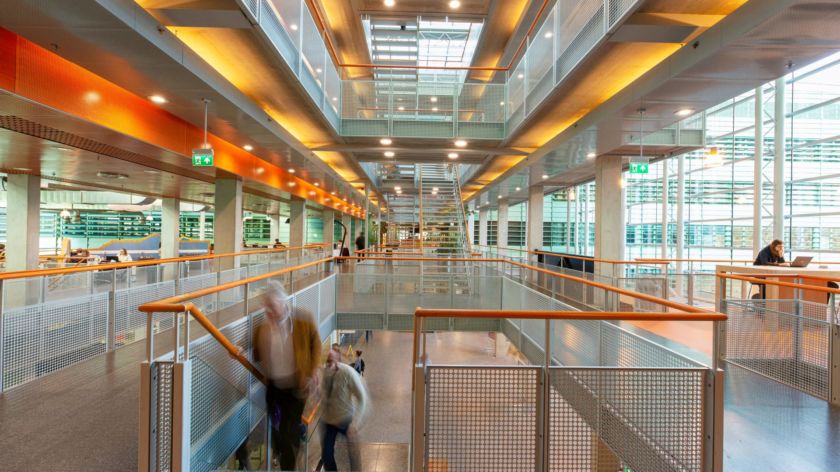Science students worried about disappearing computer rooms
-
 Het Huygensgebouw. Photography: Dick van Aalst
Het Huygensgebouw. Photography: Dick van Aalst
The number of workspaces with computers in the Huygens building might shrink. The Faculty of Science wants to use the rooms for different purposes as well. Students are afraid they will now have to buy expensive laptops that can run special software for their studies.
It is a common sight at the Huygens building: students working on assignments at computer workspaces. The question is how much longer that will be the case. The faculty wants to reduce the number of these so-called terminal rooms in order to use them for other (educational) purposes as well.
Students like third-year physics and astronomy student Romy Vermaak (22) are worried. She is afraid she might no longer have a workspace to work on her computer assignments, and that students will now have to buy expensive laptops. That is because the computers in the terminal rooms run special software. Those often require a dual-boot function that combines the operating systems Ubuntu Linux and Windows.
‘To be able to use the correct software, students will have to buy special, expensive laptops’
That software cannot be installed on all laptops. Vermaak: ‘To be able to use the correct software, students will have to buy special, expensive laptops.’
‘Those laptops are already advised to have as a student, but soon they will be mandatory because you don’t always have access to a terminal room,’ fellow student Tycho Jongens (20) adds.
Survey
Jongens thinks the Faculty of Science hasn’t communicated sufficiently about these plans. ‘The newsletter this month only announced that Bring Your Own Device (BYOD) would be implemented, not that terminal rooms would disappear.’
The newsletter contains a link to a survey where students and lecturers can give input on what should happen to the terminal rooms, and at what speed. The project group that is going to implement BYOD (which also has student members) will advise the faculty board. ‘It would have been better if the faculty had sent a separate email so that students would have been better informed about the plans to reduce the number of terminal rooms, and so that students would have been able to give their opinion,’ Vermaak thinks.
‘The voice of students is important when designing the plan’
Shortage of space
The Huygens building has been dealing with a shortage of space for a while. The number of squared meters in the building has already been reduced from 15 to 10 per full-time employee. ‘It’s getting cramped,’ director of IMAPP Eric Cator recently stated to Vox. The only real long-term perspective seems to be adding a fifth wing to the Huygens building. That option is on the table.
‘In the survey, they seem to assume the terminal rooms are only used for computer practicums, which is often not the case,’ says Vermaak. ‘There are plenty of students who often work on study assignments or group projects.’
Scheduling
The final decision to reduce the number of terminal rooms has not been made yet as of right now. Karen de Bruijn, Administrative Director at the Faculty of Science, stated that the faculty came up with the BYOD-policy in 2020 already. Because of covid, the plan was delayed, but has now been picked up again. ‘The first step is the evaluate the usage of the rooms by asking the input of students and lecturers in the survey that we are now conducting. The team responsible for the schedules is also looking at the usage of the rooms. When all that data is complete, we will come up with a plan.’
According to several students, the questions in the survey were set up to steer in a certain direction. De Bruijn: ‘That issue is known to us and I have already talked to two students in the participation council about this. The voice of students is important when designing the plan. The terminal rooms will not fully disappear if it is the case that students are still using them often.’



